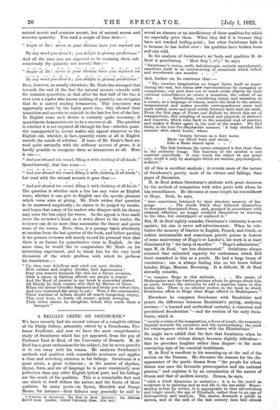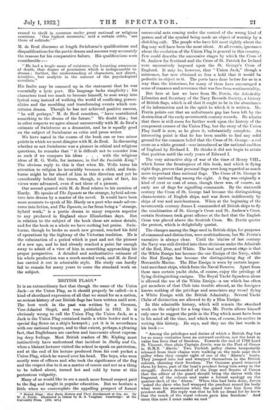A BELGIAN CRITIC ON SWINBURNE.*
WE have recently had the second volume of a complete edition of Sir Philip Sidney, admirably edited by a Frenchman, Pro- fessor Feuillerat, and now we have the most comprehensive study of Swinburne which has yet appeared, from the pen of Professor Paul de Reul, of the University of Brussels. M. de Reul has a great enthusiasm for his subject, but he never permits it to run away with his reason. He analyses Swinburne's methods and qualities with remarkable acuteness and applies a close and searching criticism to his failings. Swinburne is a great artist, a great technician ; in the matter of rhythm, thyme, form, and use of language he is more consistently near perfection than any other English lyrical poet, and his failings are the result of his qualities. This is a remarkable fact and one which in itself defines the nature and the limits of those qualities. In many poets—in Byron, Meredith and Sturge Moore, for instance—their failures may generally be said to • L'Oeuere de Swinburne. Par Paul de Reul. Bruxelles : Les Editione Robert Band. London : Oxford University Press. I15s. net.) reveal an absence or an insufficiency of those qualities for which we especially prize them. When they fail it is because they have not reached boiling-point ; but when Swinburne fails it is because he has boiled over : his qualities have broken loose and run wild.
In his analysis of Swinburne's nicl hods and qualities M. de Reul is penetrating. "Most freq T'...ttly," he says,
" Swinburne's vision, swift, kaleidoscopic, entirely ansculptural, manifests itself in an interweaving of sensations which reflect and reverberate one another , . ."
And, further on, he continues thus :-
" The creative imagination no longer limits itself to repro- ducing the real, but forms new representations by metaphor or comparison ; our poet does not so much evoke objects by their external resemblances as create a sensation, the colour of an idea. . . . Symbolism, considering image and sensation as a means, as a language of tokens, unites the ideal to the artistic temperament and makes possible correspondences more and more varied, more and more subtle between facts and our souls. From the first page of Poems and Ballads we detect this art of transposition, this mingling of mental and physical, of abstract and concrete, which runs back to the sensorial root of emotion and makes it flower again in the soul of the reader. We find there, in the true Pre-Raphaelite manner, ' A lady clothed like summer with sweet hours,' whose
' beauty fervent as a fiery moon Made my blood burn and swoon Like a flame rained upon .
. The link between the terms compared is less close than in the ordinary image. The function of the symbol is not material exactitude. It may touch the object at one point only, recall it only by analogies which are remote, psychological, indirect."
All of this is excellent analysis ; it reveals more of the nature of Swinburne's poetry, more of its virtues and failings, than pages of discussion.
M. de Reul defines Swinburne's attitude with great clearness by the method of comparison with other poets with whom he has resemblances. He discusses at some length his resemblance to Hugo. Both, he says,
" were sometimes betrayed by their absolute mastery of lan- guage. . . , The words which- they believed themselves to dominate dominated them, and, grouped in accordance with external affinities, no longer confined themselves to reacting to the idea, but outstripped or replaced it."
But, M. de Reul rightly remarks, Swinburne's virtuosity is never egoistic, his aim is never self-advertisement. When he cele- brates the memory of Gautier in English, French, and Greek, or indices interminable and sometimes puerile poems in honour of some anniversary of Hugo's or Lander's, his work is at least illuminated by " the lamp of sacrifice." " Hugo's admirations," says M. de Real, " are less disinterested." Swinburne always retained that unlimited capacity for enthusiasm which Bell Scott remarked in him as a youth. He had a large bump of veneration ; one is always finding him on his knees before Landor, Hugo, Mazzini, Browning. It is difficult, M. de Reul shrewdly remarks, " to imagine Hugo in this attitude. . . . His praise of Shakespeare and the twelve geniuses whom he groups about him as peers, betrays the intention to add a supreme name to this heroic list. There is no ulterior motive in the book in which Swinburne offers to -Hugo what Hugo offered to Shakespeare."
Elsewhere he compares Swinburne with Baudelaire and points the difference between Baudelaire's prying, analysing erotism—" a learned and methodical curiosity, a conscious and proclaimed decadentism "—and the erotism of the early Swin- burne, which is
" merely a crisis of the imagination, a fever of youth, the romantic impulse towards the excessive and the extraordinary, the need for extravagance which he shares with the Elizabethans."
He might have added that the fact that Swinburne when he tries to be most vicious always becomes slightly ridiculous— that he provokes laughter rather than disgust—is the most convincing sign of his essential healthiness.
M. de Reid is excellent in his summing-up at the end of the section on the Dramas. He discusses the reasons for the dis- appearance of the poetic drama from " the people for whom drama was once the favourite preoccupation and the national passion," and explains it by an examination of the nature of drama and that of modern society. Drama, he says,
" adds a third dimension to narrative ; it is to the novel as sculpture is to painting and as real life to the bas-relief. Repre- senting action by action, it is appropriate to that adventurous and tragic epoch, the age of Elizabeth, rather than to an age-of introspection and -analysis. The drama demands a public in unison, and at the end of the last century -men had almost
ceased to thrill in common under great national or religious emotions. ' Our highest moments,' said a certain critic, are those of solitude."
M. de Reul discusses at length Swinburne's qualifications and disqualifications for the poetic drama and assesses very accurately the reasons for his comparative failure. His qualifications were considerable :-
" He had a tragic sense of existence, the haunting awareness of death, that degree of pessimism which is indispensable to drama ; further, the understanding of characters, not direct, intuitive, but analytic in the manner of the psychological novelists."
His faults may be summed up in the statement that he was essentially a lyric poet. His language lacks simplicity ; his characters tend too much to become himself, to soar away into lyrical song instead of walking the world of conflicting person- alities and the moulding and transforming events which con- stitutes drania. Though he has not achieved positive success, " he will perhaps," M. de Reul considers, " have contributed something to the drama of the future." We doubt this ; but in other respects we agree almost unreservedly` with M. de Rees estimate of Swinburne as a dramatist, and he is equally good on the subject of Swinburne as critic and prose writer.
We have noted in the course of the book one or two minor points in which we must disagree with M. de Rea In discussing whether or not Swinburne was a pioneer in ethical and religious questions, he remarks that " it is difficult not to consider him as such if we compare his ideas . . . with the religious ideas of H. G. Wells, for instance, in God the Invisible King." The obvious reply to this is that when Mr. Wells turns his
attention to religion he invariably becomes a child, and Swin- burne might be far ahead of him in this direction and yet be considerably behind the times, though, in point of fact, his
views were advanced, even if not those of a pioneer.
Our second quarrel with M. do Reul relates to his mention of Hardy. He speaks of The Dynasts as the strange, hybrid adven- ture into drama by a master of the novel. It would have been more accurate to speak of Mr. Hardy as a poet who made adven- tures into fiction, and The Dynasts, so far from being a " strange, hybrid work," is a poetic drama in many respects superior to any produced in England since Elizabethan days. But in relation to the subject of the book these are minor details, and for the book as a whole we have nothing but praise. Swin- hurne, though he broke so much new ground, reached his field of operations by the highway of the Victorian tradition. He is the culmination of a period which is past and not the pioneer of a new age, and he had already reached a point far enough away to admit of a view of him in something approaching his proper perspective. A detailed and authoritative estimate of his whole production was a much-needed work, and M. de Reul has carried it out in admirable style. His study can hardly fail to remain for many years to come the standard work on the subject.











































 Previous page
Previous page